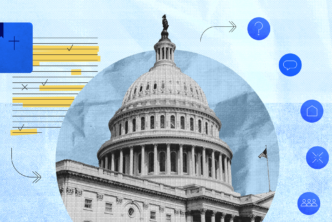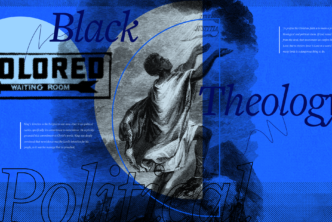Here are six quotes from theology professors, pastors, and our own Logos staff on why we should read theologians with whom we don’t agree.
Reading theologians with similar views is like cozying up next to a fireplace on a winter day in a favorite chair. It feels comfortable. Safe. Those like-minded wise ones become leaders of the tribe with which we belong, the theological clique we ascribe to, find affirmation in, and sometimes form pieces of our identity.
If I’m honest, it’s where I tend to camp.
Yet I’ve learned there’s a benefit to reading theologians who have sought diligently to divide the Word of truth rightly—even if, in the end, I don’t agree with their view.
***
Back when I came to seminary, I was completely certain about trichotomy—humans are spirit, soul, and body, just as 1 Thessalonians 5:23 said. I was reading a theologian who disagreed with me who took me to Mark 12:30, a passage I’d memorized, meditated on, and taught in my church. In effect, Berkhof asked, “How many parts to the person in this passage?” showing me that like the 1 Thessalonians verse, Mark is talking about whole person sanctification. “Spirit, soul, body” was challenged by “heart, soul, mind, and strength.” I would never have made that connection because the Keswick view I brought to the text made this passage invisible in relation to the question of the number of parts of the person.
Read people you disagree with to see such things as new possibilities for interpreting passages and new ways to connect theological dots and unexplored issues. Reading other views firsthand for understanding will reduce caricaturing opposing views. Arminians might stop tilting at the Calvinist straw man of fatalism and Calvinist with the Arminian strawmen of semi-Pelagian works-based salvation.
You may well end up staying in your disagreement. But you will likely deepen your own view. Done well, you will have a deeper respect for others and might actually become friends if you were to risk engaging them in conversation.
— Gerry Breshears, PhD, Professor of Theology, Western Seminary
Part of becoming a competent theologian is learning to see both what “is” as well as what “is not.” We need contrasts and variances to be able to see texture. We need to interact with arguments and occasionally even to argue. Paradoxically, we often learn truth by recognizing error. For this reason, we do well to not only study Scripture and the great heritage passed down to us in the Creeds and Confessions but also to learn to read well. Reading well is reading with a discerning eye. Like eating watermelon, we savor the sweet fruit and spit out the seeds. We cannot do this—or learn to do this—without regularly reading theologians with whom we disagree.
— Rev. Dr. Matthew Everhard, Senior Pastor, Faith Evangelical Presbyterian Church, Brooksville, FL
I generally offer three reasons for reading theologians I disagree with—two that are more general and one that is specific to particular kinds of theologians. The first is that it’s difficult to learn if you only read people who are either reaffirming what you already think or are offering new information that fits neatly into categories you already have. If you really want to learn and grow, you have to expose yourself to importantly different ways of thinking about things. Second, nothing sharpens your own understanding of an issue more than encountering someone who holds a different position and then having to figure out exactly why you disagree with it.
Both of those apply to reading pretty much anything you disagree with, but my third reason is a bit more specific. My favorite kinds of theologians are those that I think are not merely wrong about an issue but are interestingly wrong. Although I can certainly learn from almost anyone articulating a perspective different from my own, what I really seek out are those thinkers who offer perspectives that are provocatively different from my own—surprising new angles on a topic that require me to completely reconsider my own thoughts and ideas. They may not change your mind in the sense of causing you to agree with their position, but those are the theologians you cannot engage without your mind being changed.
— Dr. Marc Cortez, Professor of Theology, Wheaton College
Sometimes we dismiss a theologian because a minor or insalient argument they’ve made triggered someone with a voice in our tribe. This can cause us to throw the theological baby out with the (also theological) bathwater. Actually reading theologians instead of letting others evaluate them gives us a chance to suspend judgment by engaging arguments instead of people or tribes, which in turn frees us up to develop our intellectual honesty.
If our aim in reading and doing theology is to arrive at theological truth—to “think God’s thoughts after him”—it has to be possible that someone somewhere has gleaned a facet of theological truth, one or some of God’s thoughts, outside the bounds of our denominational persuasion. So we shouldn’t be reading only theologians we (think we probably should) agree with, but with Scripture as our guide, we should be looking for theological truth wherever it can be found. Wrestling with theology, good, bad, strange, and abhorrent, makes our ability to reason and engage stronger. It helps us to pivot and meet the world on the ever-changing field of ideas. It gives us skill in formulating an answer when we hear the question: What about this teaching, doctrine, perspective? And that’s partly because we’ve developed skills in critical thinking, but it’s also because there is nothing new under the sun. A new curveball is going to be much easier to hit if we’ve already engaged in battle with an idea’s forbears.
— Thom Blair, Logos Staff
I’ve found that reading people with whom I disagree has helped shape my own thought in the same way that hearing a bad sermon spurs me to think of how the passage might be more adequately addressed. Having a counterpoint against whom you can refine your own thought is always helpful.
— Dr. Todd Brewer, PhD Durham University, Durham, England
Frankly, I don’t go looking to read books by theologians I disagree with. But I often come across books that contain comments or ideas that challenge my own thinking on a particular subject. My first inclination is to say to myself, “This guy doesn’t have all the facts and must be wrong.” But on further reflection, I sometimes begin to wonder if he or she is right, and I have somehow allowed my background, experience, or presuppositions to cloud my own thinking.
Reading a theologian I disagree with usually motivates me to explore the subject with renewed interest and objectivity. Even when further study leaves me disagreeing, I have often benefited from what the other person has to say. When I read, I am always “sifting,” looking for good insights and letting the “chaff” fall away. There is usually something I can learn from reading people I disagree with.
— J. Carl Laney Professor of Theology (retired), Western Seminary
Related articles
- 5 Black Theologians from Church History You Should Know
- Women in Theology: Why the Church Needs Female Theologians
- How Evangelical Theologians Are Tackling the Doctrine of the Trinity




